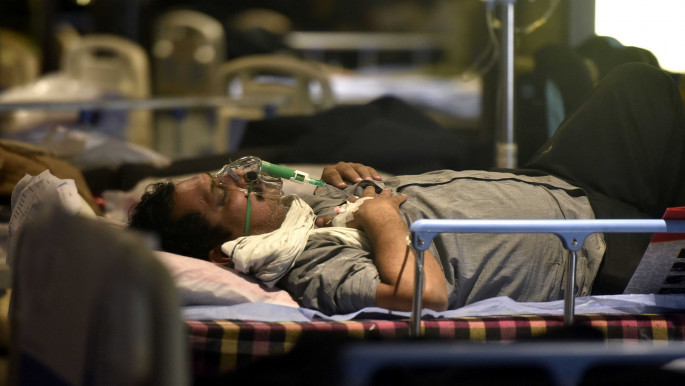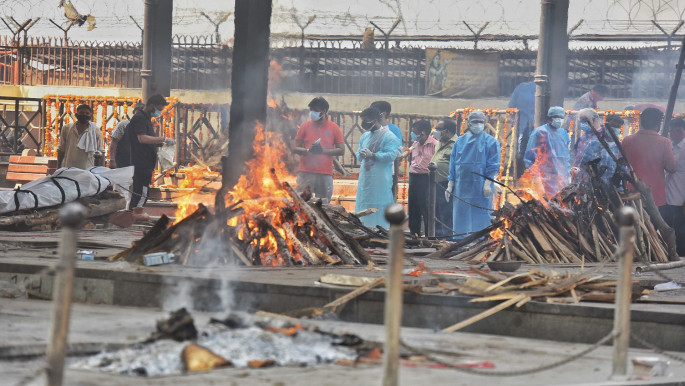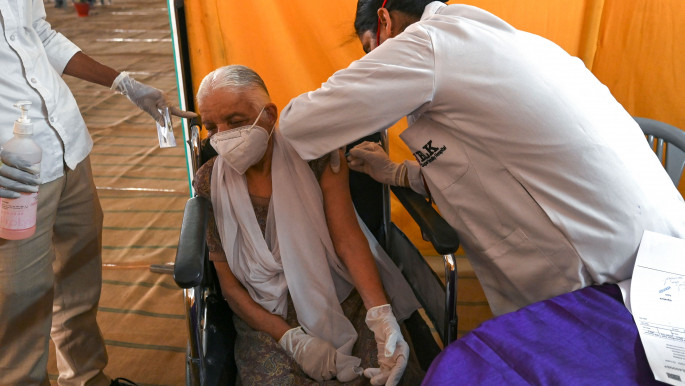'We're living in hell': India in catastrophe as overcrowded hospitals buckle under a Covid tsunami
Similarly, private hospitals have also been pushed to the limit and are reaching a breaking point – amid the double mutant rise which is consuming citizens of all age groups.
Unfortunately, this has become the tragic routine as different states across India are swamped with virus related fatalities.
Patients who are severely sick gasp for breath, whereas, others linger for hours in the hope to get a bed where frontline warriors, including doctors and nurses, are doing their best to cater for the overwhelming demand in the plague-hit country.
Like hundreds of others, Priya Devi, 42, took her last breath on the pavement after she was refused admission from 17 hospitals in the Indian capital, New Delhi. The sole reason for denying her entry was hospitals have non-availability of beds and ventilators.
"We went to almost 20 hospitals but returned empty-handed before she died. There is no one to take care of my children?" the crestfallen husband of Rukmani, Manoj (name changed) narrated, describing his ordeal after running from pillar to post to get his wife admitted.
The mother of two died moments after an oxygen cylinder was arranged for her from one of the hospitals.
 |
Patients who are severely sick gasp for breath, whereas, others linger for hours in the hope to get a bed where frontline warriors including doctors and nurses are doing their best to cater for the overwhelming demand in the plague-hit country |  |
In another similar traumatic case, 13 hospitals across Delhi-NCR denied admission to Kamla, 39, who later died yards away from Delhi's government-run hospital.
"It's a hell we're living in. Who's going to hear our cries?" Kamla's relative said.
The pictures that have proliferated in recent weeks across India stand as strong evidence that the health policies from the government have failed to curb the deadly infection.
The scenes outside hospitals across India are heart-breaking and many feel they are living in a "doomed country" and are fighting their battle on their own.
"The government is providing skewed data... We've lost the plot completely. It's the complete breakdown of the whole goddamn system," said virologist Shahid Jameel.
Scientists who are closely tracking the virus forecast that if the brutal surge continues, it will further unfold into a global tragedy that will be hard to tackle in the foreseeable future.
 |
| Oxygen is a precious commodity in India's grief-ridden hospitals [Getty] |
"The public-private partnership has become a necessary exercise, owing to the healthcare capacity in the times of this pandemic," said Dr Jyoti Joshi, who is the South Asia head for the Centre for Disease Dynamics, Economics and Policy (CDDEP).
The independent body reported that India only has a little over 19,000 hospital beds, 95,000 ICU beds and nearly 5,000 ventilators to treat patients around the country, while doctors reiterated that they are facing numbers at least 100 times higher.
The experts in the country believe that such a dire situation was created by holding political rallies besides the Kumbh Mela, the mega Hindu festival which ended up being a super spreader event.
 |
Covid has choked India's healthcare system and the country could witness 500,000-700,000 cases in the next couple of weeks if the deadly infection continues at this speed |  |
"Covid has choked India's healthcare system and the country could witness 500,000-700,000 cases in the next couple of weeks if the deadly infection continues at this speed," Prakash Kumar, an expert explained.
"By holding political rallies and festivals has proved that it was the callous attitude from the top-brass of the country that has brought us to this state," he added.
In recent months, the country had underestimated the threat of the virus which eventually saw the government failing to put forward an inclusive plan to address the issue which left India ravaged.
The second wave of COVID-19 has stirred fresh fears among people at a time when the country is reeling under an acute shortage of healthcare infrastructure as cases surge.
|
The new variants have brought the healthcare sector close to collapse and patients are bearing the brunt of the limited facilities.
Some have even called for temporary hospitals to be built across India to fight the deadly infection.
The private hospitals across India face a similar predicament as they had to send out SOS messages to receive oxygen supplies day in and day out.
"To deal with this calamity we're hapless despite having the best possible services to provide. We're working to the fullest capacity possible for us. But what's not in control is not, simple," Shahnawaz Khan said, one of the surgeons at Gurugram's Metro Heart Hospital.
"We're working amid a disaster," he added.
Another doctor Himanshu maintained that they're ready to face the challenge and will work with utmost sincerity to save precious lives.
"Our backs are against the wall. It's an unprecedented situation we're living in, but we're not going to give up despite grappling with an oxygen shortage," he stated.
Like other hospitals, the multi-super speciality hospital also ran out of oxygen before the supply reached around 3:40 PM on April 24.
 |
| The expected knock-on effect of a healthcare system under pressure [Getty Images] |
"We are receiving a lot more youngsters now who are suffering from a severe lung infection which has also become a cause of concern as polluted cities could add more miseries to such patients," said Vishal, a pulmonologist from New Delhi.
Anil Kumar, who is treating patients in Gujarat, a state on the western coast of India, said, "The situation is entirely different from the first wave. Now, it is all about pick and choose when it comes to attending to a patient. For the last one month, I couldn't meet my family members. I feel like I have turned into a machine. This is the situation inside the hospital wards."
 |
Now, it is all about pick and choose when it comes to attending to a patient. For the last one month, I couldn't meet my family members. I feel like I have turned into a machine |  |
Manoj Yadav, a physician, who works in Delhi's government-run hospital, has treated over 1,000 COVID-19 patients ever since the infection was reported in India.
"It's battle within a battle and to be pretty clear the ticking time bomb has been set free due to the callous attitude from people," he told The New Arab.
"Somewhere down the line, we have made blunders that have resulted in this infection claiming lives at such a rapid speed. It's going to take some time to get back on track."
Desperate patients are even trying to reach out to doctors on social media in the middle of the night highlighting how severely the country has been ripped by the second wave.
It has forced most of the hospitals across India to convert their lobbies to COVID centres following the bulk of patients reaching out for treatment.
"We work hard to save one life and at that time, 5-10 will die for not getting the aid," said Praveen, who has been in private practice for over two decades.
"The truth is that we can't reach out to everyone and at the same time, we are putting our own life in danger. We are not finding any solutions to the growing numbers and it is shattering us as medics. I am working 15 hours a day to deal with COVID-19 patients. Whenever I walk into the emergency room it's just a nightmare."
 |
| What will it take to stem the spike of COVID-19 cases, and deaths, in India? [Getty Images] |
 |
It's a horrifying time. The corpses are lying on the streets and parking lots are turned into a crematorium |  |
Furthermore, cremations are now taking place across India's streets as most crematorium grounds no longer have space for funeral rituals.
"It's a horrifying time. The corpses are lying on the streets and parking lots are turned into a crematorium," said Vijay, who has been ferrying bodies in an ambulance in Delhi.
"One individual who brought a dead body to the Seemapuri Crematorium Ground in Old Delhi was charged INR 25,000 (£241) by an ambulance driver. What's going on in our country?" asked BJP leader Jitender Singh Shanty, who is also the founder of Shaheed Baghat Singh Seva Dal, an NGO that cremates unclaimed bodies.
And it seems ambulance drivers are not the only group taking advantage of the dire situation. Recently, a gang was in trouble in west Delhi's Uttam Nagar area for selling fire extinguishers instead of oxygen cylinders.
"I was duped despite being educated so what will happen to those who are not aware of such deceitful people. I realised at home that it is a fire extinguisher rather than an oxygen cylinder," said Geeta Arora.
Scientists from IIT Kanpur have maintained that the virus will continue to peak in mid-May however could subside later. But for now the situation remains grim for millions living in India.
Tahir Hussain Sofi is a freelance journalist who switches from Kashmir to New Delhi





 Follow the Middle East's top stories in English at The New Arab on Google News
Follow the Middle East's top stories in English at The New Arab on Google News


